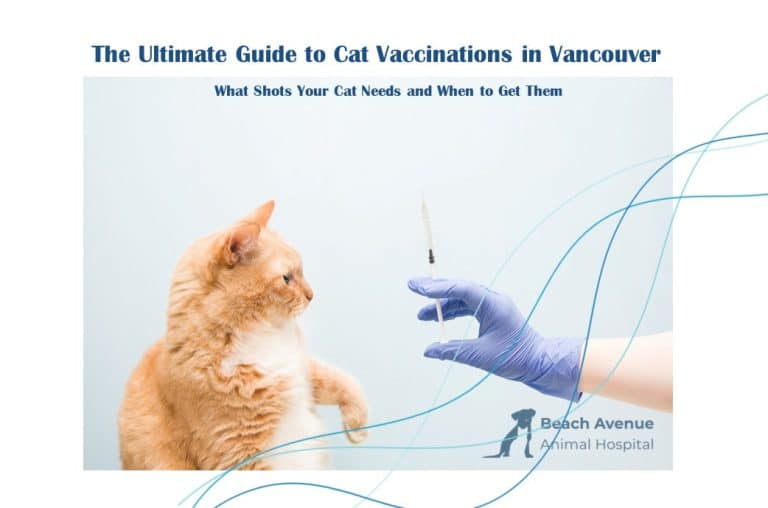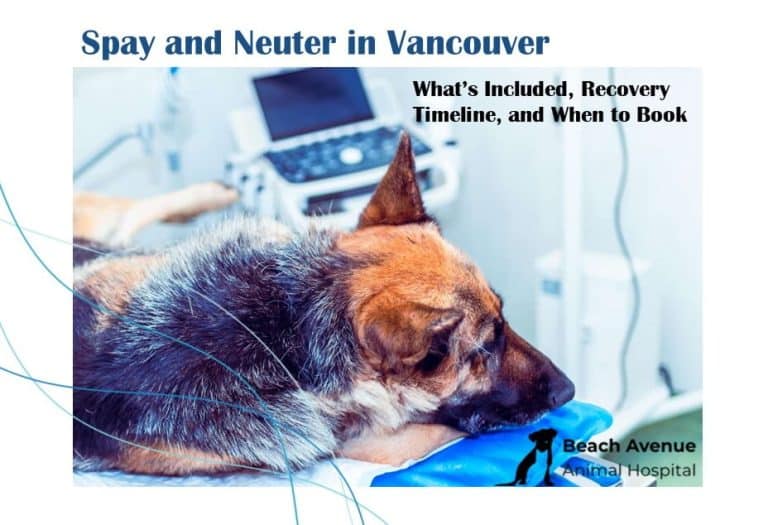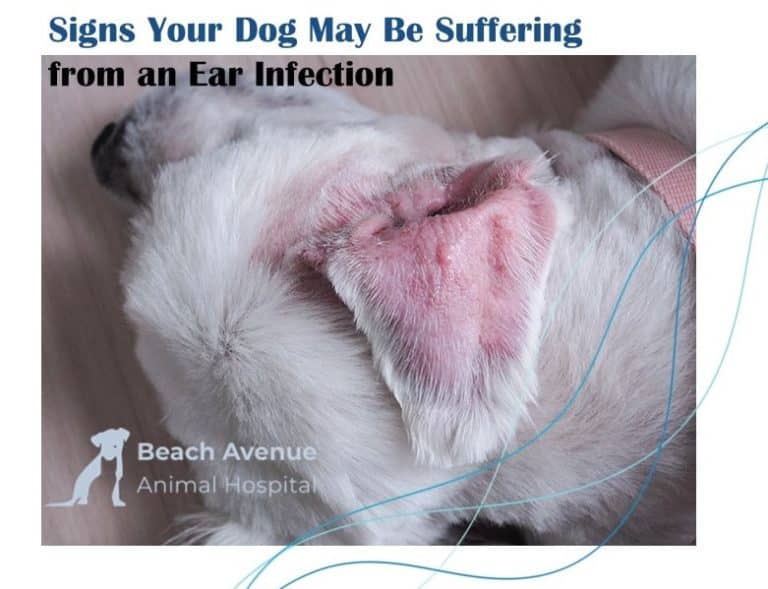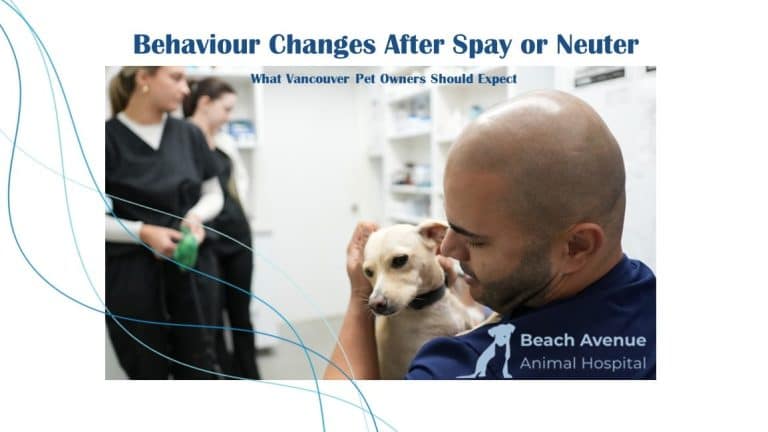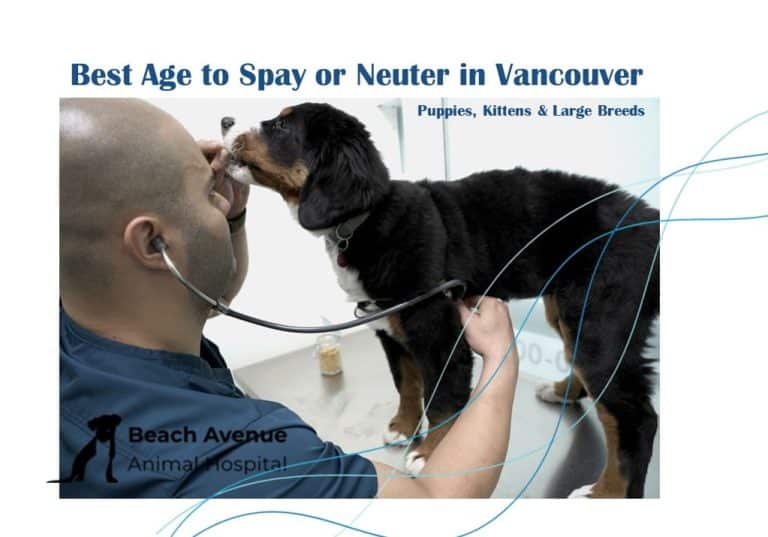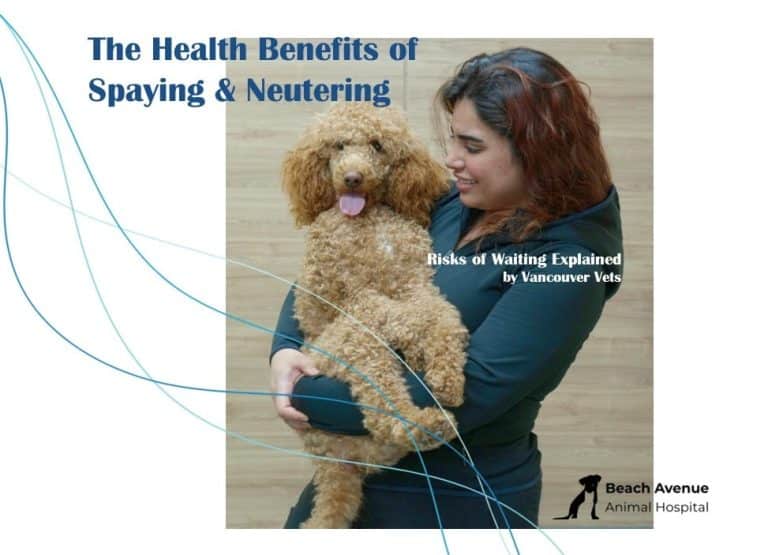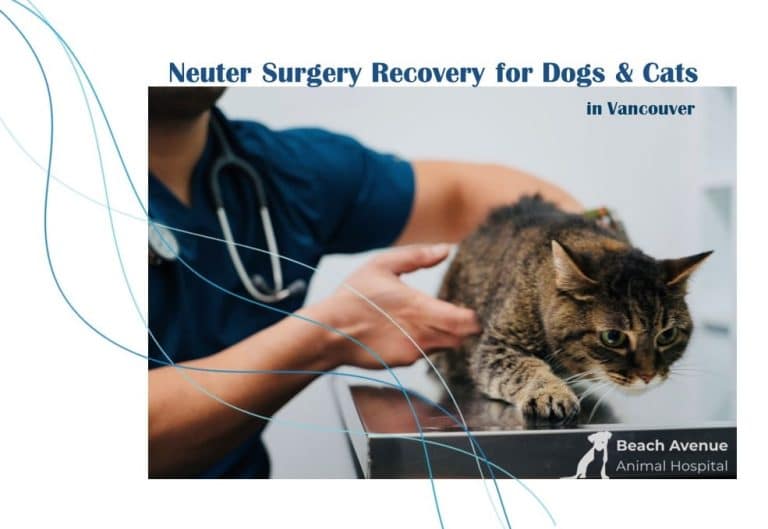One of the best things you can do for the health of your pet is spaying or neutering. At Beach Avenue Animal Hospital, we prefer to spay or neuter cats and most dogs around 7 to 8 months to 1 year of age, ideally before their first heat (before they reach sexual maturity). We recommend spaying or neutering all pets who won’t be bred.
Spaying or neutering can give your pet a healthier life—and may even help your pet live longer.
BENEFITS OF SPAYING/NEUTERING YOUR PET
Spaying or neutering your pet helps reduce or eliminate undesirable behaviours, such as:
- Defending territory
- Fighting
- Humping/mounting
- Marking (spraying urine)
In addition, the procedure may help prevent aggression in some dogs and cats, and pets who have been spayed or neutered are less likely to try to escape or roam to find mates.
Spaying or neutering your pet also reduces other health and behavioural issues. Spayed female pets won’t go into heat, so they won’t have discharge or suffer from hormonal fluctuations that can cause medical and behavioural problems. Spayed pets also can’t get pregnant or give birth, so they avoid any associated health complications, some of which can be life-threatening.
RISKS OF NOT SPAYING/NEUTERING YOUR PET
Dogs or cats who aren’t spayed or neutered are at higher risk for certain cancers. Because spaying or neutering removes the reproductive organs so pets can’t reproduce, the procedure eliminates a pet’s risk of ovarian or testicular cancer and dramatically lowers the risk of breast (mammary gland), prostate, and uterine cancer.
Intact female dogs and cats (those who aren’t spayed) can also get pyometra, a serious bacterial infection of the uterus. When spayed early in life, pets have a far lower risk of developing this potentially deadly condition.
WHAT TO EXPECT DURING YOUR PET’S SPAY/NEUTER PROCEDURE
Before the spay or neuter surgery, we’ll let you know what time to start withholding food and water. You’ll be asked to drop your pet off at your Beach Avenue Animal Hospital in the morning.
Your pet will be asleep for the procedure. Just like in human surgeries, your pet will receive an injection to help him or her relax before being given general anaesthesia.
We monitor all pets closely during this procedure, making sure that they stay comfortable and their heart rate and breathing remain normal.
Neutering (removal of the testicles) tends to be fairly quick. Spaying takes a bit longer because it’s a more involved procedure. It requires removing the uterus and ovaries, both of which are internal organs.
AFTER YOUR PET’S SPAY/NEUTER PROCEDURE
When your pet wakes up from anaesthesia, we give him or her several hours to recover comfortably and safely at our hospital. We send most pets home the same day of their surgery, along with pain medication and instructions so you know what to watch for and how to care for your pet as he or she recovers. (Some pets may need to stay with us overnight or for a few days.)
Besides keeping a close eye on your pet that first evening and night, here are some tips to help ensure a smooth recovery and avoid complications:
- Make sure your pet’s protective cone stays on. If you must remove the cone so your pet can eat, watch your pet the entire time to make sure he or she doesn’t try to lick or chew the incision area.
- Limit your pet’s activity for at least the rest of the day. Some pets (especially female pets and older pets) may need to have their activity restricted for longer. We’ll provide you with specific recovery recommendations for your individual pet.
- Keep your pet from rubbing the incision against furniture, the floor, or other surfaces.
- Consider switching to a padded or inflatable collar if your pet is having trouble adapting to the Elizabethan collar (E-collar). Be aware that some pets (such as Dachshunds and other pets with long bodies) can physically get around these alternative recovery collars and reach their incisions. Some dogs or cats may also be able to outsmart or chew through soft collars.
Female dogs take more time to recover than males. We’ll let you know when to expect your pet to feel better and how long you’ll need to leave the collar on.
DEBUNKING MYTHS ABOUT SPAYING/NEUTERING
While we’re at it, let’s clear up a few myths about spaying and neutering:
- Spaying/neutering doesn’t make pets fat. A pet’s metabolism may slow a bit after the procedure, but you can adjust for this by continuing to watch your pet’s food intake, cutting calories if needed, and making sure your pet gets enough exercise.
- Neutering doesn’t make male dogs less masculine.
- Spaying or neutering won’t change your pet’s natural instincts, intelligence, playfulness, or personality.
If you have any questions or concerns about your pet being spayed or neutered, please ask us!
SPAYING/NEUTERING BENEFITS YOU, YOUR PET, AND YOUR COMMUNITY
Spaying or neutering benefits both you and your pet by reducing your pet’s risk of certain diseases, reducing the risk of other health complications, and cutting down on undesirable behaviours. Your dog or cat will not only have a healthier life after the procedure but he or she may even live longer!
Schedule an appointment for your pet’s spay or neuter today.
Another benefit of spaying/neutering is preventing unwanted pets. We have many stray and community cats in Vancouver, so we urge you to do your part by making sure your pet won’t contribute to the homeless pet population.


